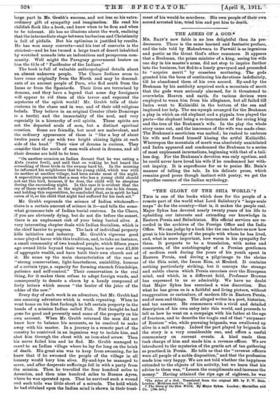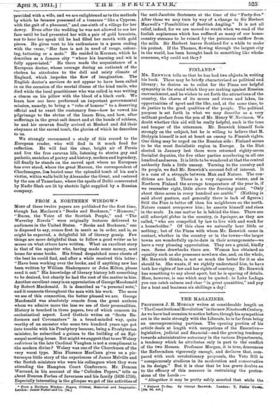"THE GLORY OF THE SHIA WORLD." -f Tars is one
of the books which does for the people of a remote part of the world what Lord Salisbury's " large-scale maps " do for the country—that is, it makes the people real. Major Sykes has devoted nearly twenty years of his life to • upholding our interests and extending our knowledge in Eastern Persia and Beluchiatan. His official services are re- corded in the archives of the Foreign Office and the India Office. We can judge by a book like the one before us now how great is his knowledge of the people with whom he has lived, and, what is more important, how warm is his sympathy for them. It purports to be a translation, with notes and comments, of the autobiography of a Persian gentlemen of medium rank during the years of his youth spent in Eastern Persia, and during a pilgrimage to the shrine of the Shia saint., the Imam Riza, at Meshed. It contains nothing particularly striking, but it conveys the strange and subtle charm which Persia exercises over the European mind, and which, in a different field, Professor Browne has expressed to us so admirably. We have no doubt that Major Sykes has exercised a wise discretion. But what he has given us is a faithful and living picture, without exaggeration or caricature, of modern life in Eastern Persia, and.of men and things. The alleged writer is a poet, historian, and tax assessor. He commences with a vivid and detailed : description of his own entry into this world, and proceeds to tell us how he went on a campaign with his father at the age of fourteen, and to describe the tragic end of that " surpasser of Rustem" who, while pursuing brigands, was swallowed up alive in a salt swamp. Indeed the part played by brigands in the story is a very considerable one, and offers a useful commentary on current events. A kind uncle then took charge of him and made him a revenue officer. We are introduced to the mysteries of the gentle art of tax gathering as practised in Persia. He tells us that the "revenue officers were all people of a noble disposition," and that the profession made him very happy. We are not told whether the happiness extended to the objects of his activity, but we learn that hie advice to them was, " Lessen the compliments and increase the money." Having attained the ripe age of eighteen, he was
• The Ashes of a God. Translated from the original MS. by F. W. Baim London : Methuen and Co. 158..net.1 t The Glory of the Shia World. By-Major Sykes. Loudon : Macmillan and Co. VOL net.)- provided with a wife; and we are enlightened as to the methods by which he became possessed of a treasure " like a Cypress, with the gait of a pheasant," and one-sixth of a village for her dowry. Even after the wedding he was not allowed to see her face until be had presented ber with a pair of gold bracelets, nor to hear her speak till he had filled her mouth with gold pieces. He gives vent to his enthusiasm in -a poem ending with the verse, "Her face is not in need of 'rouge, colour- ing, tattooing or a mole." He resided in Kerman, which he ' describes as a famous city " where his learning and‘ wit is fully appreciated." He there made the acquaintance of a European doctor, whose courage during an outbreak of the cholera he attributes to the dull and misty climate of England, which , impedes the flow of imagination. The English• doctor's services do not appear to have been called in on the occasion of the mortal illness of the kind uncle, who died while the local practitioner who was called in was writing a charm on his pillow with the blood of a black cock. We !earn how our hero performed an important governmental mission, namely, to bring a "robe of honour" to a deserving official and to exact the customary fees—how he vowed his pilgrimage to the shrine of the Imam Riza, and how, after sufferings in the great salt desert and at the hands of robbers, be and his caravan finally arrived at Meshed and did their obeyance at the sacred tomb, the glories of which he describes to us. We strongly recommend a study of this record to the European reader, who will find in it much food for reflection. He will feel the clear, bright air of Persia and live the free caravan life, listening to stories gay and pathetic, snatches of poetry and history, modern and legendary, till finally he stands on the sacred spot where no European has ever stood, where the great Haroun, the correspondent of Charlemagne, lies buried near the splendid tomb of his son's victim, within walls built by Alexander the Great, and restored by the son of Tamerlane, where the spoils of Delhi consecrated by Nadir Shah are lit by electric light supplied by a Russian company.











































 Previous page
Previous page